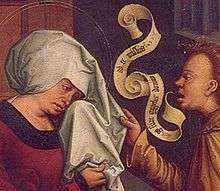Definify.com
Webster 1913 Edition
Phylactery
Phy-lac′ter-y
,Noun.
pl.
Phylacteries
(#)
. [OE.
filateri
, OF. filatire
, filatiere
, F. phylactère
, L. phylacterium
, Gr. φυλακτήριον
, fr. φυλακτήρ
a watcher, guard, φυλάσσειν
to watch, guard. Cf. Philatory
.] 1.
Any charm or amulet worn as a preservative from danger or disease.
2.
A small square box, made either of parchment or of black calfskin, containing slips of parchment or vellum on which are written the scriptural passages Exodus xiii. 2-10, and 11-17, Deut. vi. 4-9, 13-22. They are worn by Jews on the head and left arm, on week-day mornings, during the time of prayer.
Schaff-Herzog Encyc.
3.
Among the primitive Christians, a case in which the relics of the dead were inclosed.
Webster 1828 Edition
Phylactery
PHYLAC'TERY
,Noun.
1.
In a general sense, any charm, spell or amulet worn as a preservative from danger or disease.2.
Among the Jews, a slip of parchment on which was written some text of Scripture, particularly of the decalogue, worn by devout persons on the forehead, breast or neck as a mark of their religion.3.
Among the primitive christians, a case in which they inclosed the relics of the dead.Definition 2026
phylactery
phylactery
English
Noun

A phylactery in a painting.
phylactery (plural phylacteries)
- (Judaism) Either of the two small leather cases, containing biblical scrolls, worn by Jewish men at morning prayer; the tefilla.
- 1526, William Tyndale, trans. Bible, Matthew XXIII:
- They sett abroade there philateris, and make large borders on there garmenttes, and love to sytt uppermooste at feastes [...].
- 2005, Edward Mack, Phylactery, Nextbible.
- "Every male, who at the age of 13 becomes a "son of the Law" (bar mitswah), must wear the phylactery and perform the accompanying ceremonial."
- 1526, William Tyndale, trans. Bible, Matthew XXIII:
- Any small object worn for its magical or supernatural power; an amulet or charm.
Synonyms
- (small leather case): tefilla
Translations
small object worn for its power; amulet or charm
leather case containing biblical scrolls, worn by Jewish men; the tefilla
|
|
References
- ↑ Archbishop of Utrecht, Arnold II van Hoorn, 1372-1375.